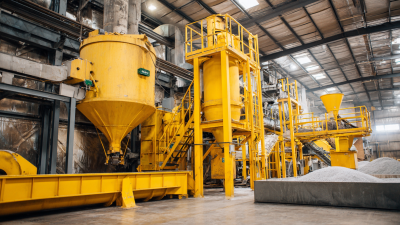Revolutionizing Home Textiles: The Future of Cotton Towel Making Machines Explained
Table of Contents
- The Evolution of Cotton Towel Making Machines: A Historical Perspective
- Innovative Technologies Shaping the Future of Towel Production
- Understanding the Environmental Impact of Modern Cotton Towel Machines
- Cost-Effectiveness and Efficiency: The New Standards in Towel Manufacturing
- Key Players in the Cotton Towel Machine Industry and Their Contributions
- Future Trends: Automation and Smart Technology in Towel Production
- Enhancing Textile Production Efficiency with the FD Malivlies Stitch Bonding Machine
- FAQS
- Conclusion
- Related Posts
The cotton towel making machine is pretty much a game-changer in the textile world. It has the potential to really shake up how towels are made and sold. DANYANG YIXUN MACHINERY CO., LTD, a top-notch manufacturer with expertise in multiaxial and biaxial warp knitting, stitch bonding, and towel warp knitting machines, is leading the way in this exciting shift. As people start craving higher quality and more eco-friendly textiles, having advanced machinery on your side becomes more and more important to meet those demands.

In this article, we’re going to take a look at what’s next for cotton towel machines—talking about new tech that not only boosts production speed but also supports greener practices. By blending the latest innovations with traditional manufacturing methods, DANYANG YIXUN is set to raise the bar in the towel industry, paving the way for a more sustainable and successful future.
The Evolution of Cotton Towel Making Machines: A Historical Perspective
Over the years, the way cotton towels are made has obviously come a long way. You can see it clearly in how technology has advanced and how what people want from their towels has shifted. Back in the day, everything was pretty much done by hand, with simple looms that took ages and didn’t give much room for fancy designs. Then, in the early 1900s, things started to change with machines taking over. That turned everything around—production got faster, and the quality stayed more consistent, which really helped the industry grow. Funny enough, reports show that the market for making cotton towels has been steadily expanding, with about a 4% growth each year from 2021 to 2026. That's mainly because more folks are on the lookout for eco-friendly, top-notch textiles nowadays. More recently, things have gotten even cooler with automation and smart tech coming into play. These days, high-tech machines with features like computer-aided design (CAD) let companies whip up custom towel designs super quickly. According to some study by MarketsandMarkets, the global textile machinery market could hit around USD 20.8 billion by 2025. That just highlights how important innovation is for meeting consumers’ growing demands for sustainable and versatile products. As manufacturers keep pushing forward with these new techs, it looks like the future of making cotton towels will be more efficient, eco-friendly, and better than ever before.
Innovative Technologies Shaping the Future of Towel Production
The future of towel making is really changing thanks to some pretty cool new technologies that boost efficiency, versatility, and sustainability. With all the latest machinery advancements, manufacturers can now craft high-quality towels that keep up with what consumers want today, all while cutting down on waste. Automation and smart manufacturing are making things smoother, speeding up production times and cranking out more towels—something that’s super important to stay competitive out there.
DANYANG YIXUN MACHINERY CO., LTD is definitely playing a key role in all this. They’re experts in cutting-edge multiaxial and biaxial warp knitting machines. Their towel warp knitting machines are actually pretty impressive, designed to produce a variety of textile products with top-notch precision and consistency. By pushing forward with innovation in textile tech, DANYANG YIXUN is setting new standards for quality and efficiency in towel production, really stepping up as a leader in the cotton towel industry.
Understanding the Environmental Impact of Modern Cotton Towel Machines
You know, when it comes to making cotton towels today, the environmental impact can really be quite a big deal. It’s no secret that there's growing concern around sustainability in the textile world. For example, a report from the International Cotton Advisory Committee points out that producing traditional cotton textiles can suck up more than 20,000 liters of water for just one kilogram of cotton—that's a ton of water, right? No wonder water use is such a hot issue. But here’s the good news — technology is actually catching up. These days, newer machines are coming with smart water-saving features that can cut water usage by about 30%. That’s a huge step toward reducing the environmental footprint of making towels.

And it’s not just about saving water. Modern machines are also designed to use less energy and produce less waste. According to the Global Sustainability Report, these energy-efficient models can slash energy consumption by up to 40% compared to the older gear. Plus, innovations like digital printing and automated cutting aren’t just speeding things up—they’re also helping to cut down on fabric waste, which is a big deal when you’re trying to be more eco-friendly. As manufacturers keep ramping up these advanced tech features, it looks like the cotton towel industry is really moving towards a greener, more sustainable future in the world of home textiles.
Cost-Effectiveness and Efficiency: The New Standards in Towel Manufacturing
You know, the way towel manufacturing has been evolving lately is pretty impressive. There’s a real push towards making things more cost-effective and speeding up production without sacrificing quality. Honestly, with the global towel market expected to hit around USD 13.3 billion by 2026, manufacturers really need to jump on new tech to stay competitive. Take advanced warp knitting machines from companies like DANYANG YIXUN MACHINERY CO., LTD, for example — these guys are changing the game. They’ve made the whole production process way more efficient, letting companies produce faster and at a lower cost, all while keeping the quality top-notch.
And it’s not just about cutting costs; automation and precision engineering are becoming the new norm, especially with an eye on sustainability and using resources smartly. Some reports suggest that using high-tech machinery could cut down production costs by up to 30%. That’s a big deal, especially with raw material prices climbing — manufacturers need to keep prices competitive to stay afloat. Thanks to DANYANG YIXUN’s innovative tech, textile makers are better equipped to meet the rising demand for high-quality, affordable home textiles. It’s pretty exciting stuff happening in the industry right now.
Revolutionizing Home Textiles: Cotton Towel Manufacturing Efficiency
This chart illustrates the production efficiency of various types of cotton towel making machines. The comparison shows how modern and automated systems significantly increase production rates, highlighting the advancements in cost-effectiveness and efficiency in towel manufacturing.
Key Players in the Cotton Towel Machine Industry and Their Contributions
You know, in the fast-changing world of home textiles, the cotton towel machine industry really stands out, thanks to some pretty cool innovations and the efforts of key players. These days, manufacturers are putting a big spotlight on automation and sustainability—it's all about keeping up with consumer demand for top-notch cotton towels. Companies like Tsudakoma and Mayer & Cie have been trailblazers, developing cutting-edge weaving tech that not only makes the process more efficient but also cuts down on waste. The result? Softer, more absorbent towels that don’t harm the environment as much.
And honestly, research and development are a huge deal here. Groups like the Textile Machinery Association (TMA) are doing a lot to push the industry forward with new tech. They work hand-in-hand with manufacturers to come up with innovations that need less energy and water but still meet really high standards of quality. These collaborations are vital—they're helping steer the industry toward a more sustainable future and tackling some of the big challenges in today's textile manufacturing scene.
Revolutionizing Home Textiles: The Future of Cotton Towel Making Machines Explained
| Dimension | Value |
|---|---|
| Year of Production | 2023 |
| Market Size (USD) | 2.5 Billion |
| Annual Growth Rate (%) | 5.2 |
| Key Technology Trends | Automation, Sustainability, Smart Fabrics |
| Major Markets | North America, Europe, Asia-Pacific |
| Challenges Faced | High Production Costs, Competition, Environmental Regulations |
| Future Innovations | 3D Weaving, AI Integration, Eco-friendly Materials |
Future Trends: Automation and Smart Technology in Towel Production
The towel manufacturing industry is really going through a pretty big shift lately, mainly thanks to automation and smart tech. I was reading this report from MarketsandMarkets, and it says the worldwide market for smart textiles could hit around $6.4 billion by 2025. That’s mainly because of how fast technology is advancing and how companies are looking for more efficient ways to make towels. Automation isn’t just speeding things up; it also helps cut down labor costs and reduces mistakes, which means the finished products tend to be better quality overall.
One cool thing is how IoT-enabled machines let manufacturers keep an eye on production lines in real time. This makes it easier to spot and fix problems quickly, keeping everything running smoothly. Actually, data analytics even enables predictive maintenance — which Deloitte says can cut machine downtime by up to 30%. On top of that, AI is starting to play a big role in towel design, making it possible to offer loads of customization options like never before. All these trends suggest that future towel-making machines won’t just be about maximizing efficiency — they’ll also focus on creating a better overall experience for consumers, thanks to their ability to adapt and innovate.

The towel manufacturing industry is really going through a pretty big shift lately, mainly thanks to automation and smart tech. I was reading this report from MarketsandMarkets, and it says the worldwide market for smart textiles could hit around $6.4 billion by 2025. That’s mainly because of how fast technology is advancing and how companies are looking for more efficient ways to make towels. Automation isn’t just speeding things up; it also helps cut down labor costs and reduces mistakes, which means the finished products tend to be better quality overall.
One cool thing is how IoT-enabled machines let manufacturers keep an eye on production lines in real time. This makes it easier to spot and fix problems quickly, keeping everything running smoothly. Actually, data analytics even enables predictive maintenance — which Deloitte says can cut machine downtime by up to 30%. On top of that, AI is starting to play a big role in towel design, making it possible to offer loads of customization options like never before. All these trends suggest that future towel-making machines won’t just be about maximizing efficiency — they’ll also focus on creating a better overall experience for consumers, thanks to their ability to adapt and innovate.
Enhancing Textile Production Efficiency with the FD Malivlies Stitch Bonding Machine
The FD Malivlies Stitch Bonding Machine is revolutionizing textile production efficiency, especially in sectors like automotive interiors and interlining. With widths ranging from 2800mm to 4400mm and gauges available in F14, F16, and F18, this machine offers versatile solutions tailored to meet the diverse demands of modern textile manufacturing. The stitch bonding technique allows for the creation of highly durable and lightweight materials, which is crucial for enhancing product performance and sustainability in automotive applications.
In terms of operational capabilities, the FD Malivlies machine boasts impressive speed, ranging from 50 to 1500 rpm, though actual speed is contingent upon the specific raw materials and finished products utilized. According to recent industry reports, the increasing demand for high-performance textiles and the growing interest in automakers’ sustainability goals are expected to drive the market for stitch bonding technology significantly. This trend underscores the necessity for advanced machinery that not only improves production efficiency but also aligns with eco-friendly practices.
Data from the Textile World market research indicates a projected annual growth of 5% in the stitch bonding sector over the next five years, highlighting an increasing focus on innovative machinery solutions. Manufacturers who invest in the FD Malivlies Stitch Bonding Machine can expect not only enhanced productivity but also an ability to maintain a competitive edge in a rapidly evolving market landscape.
FAQS
: The evolution of cotton towel making machines reflects advancements in technology and shifts in consumer demands, moving from manual labor-intensive production to mechanized processes.
It allowed for higher production rates and improved consistency in quality, significantly enhancing the efficiency of towel production.
The market is projected to grow at an annual rate of 4%, largely driven by increasing demand for sustainable and high-quality textiles.
Technologies such as automation, smart manufacturing techniques, and computer-aided design (CAD) systems are enhancing efficiency, versatility, and sustainability in cotton towel production.
DANYANG YIXUN specializes in advanced multiaxial and biaxial warp knitting machines and is setting new standards for quality and efficiency in towel production.
Companies like Tsudakoma and Mayer & Cie have made significant contributions by enhancing efficiency and reducing waste in the production of high-quality cotton towels.
Organizations like the Textile Machinery Association (TMA) promote technological advancement and collaborate with manufacturers to innovate towel-making processes, leading to more energy and water-efficient machines.
The global textile machinery market is projected to reach USD 20.8 billion by 2025, highlighting the importance of technological innovation in the industry.
Conclusion
Hey, have you checked out that article called "Revolutionizing Home Textiles: The Future of Cotton Towel Making Machines Explained"? It really dives into how these machines have evolved over the years. I found it pretty fascinating how new tech is reshaping towel production — making everything faster, cheaper, and honestly, a lot more efficient. They also talk about how these modern machines are messing with the environment, but in a way that’s more sustainable, which is a pretty big deal nowadays.
Oh, and they didn’t forget to mention the big players in the game. Like DANYANG YIXUN MACHINERY CO., LTD — those folks are all about knitting machines that help churn out cotton towels more effectively. Looking ahead, the article suggests we're headed for a future filled with smarter, automated machines that could totally change how home textiles are made. It’s like, the way we make towels is on the verge of some serious upgrades, and honestly, it’s pretty exciting to see where it’ll all go.
Related Posts
-

Understanding Biaxial Cloth: An Insight into Its Types and Applications
-

Exploring the Efficiency of Pultrusion Machines in Composite Manufacturing Process
-

Innovative Trends in Glass Fiber Industry at 2025 China Import and Export Fair with Market Insights
-

Innovative Applications of Multi-Axial Carbon Fiber in Aerospace and Automotive Industries
-

The Ultimate Guide to Understanding Wire Mesh Machines and Their Applications
-

How to Optimize Your Production Line Efficiency with a Multifunction Batching Device


